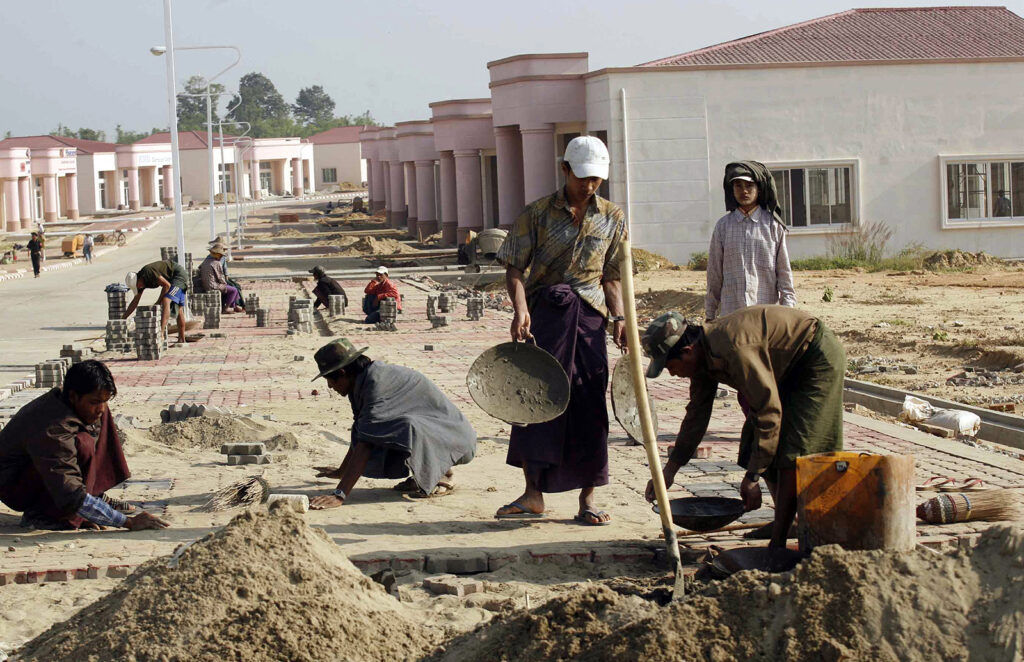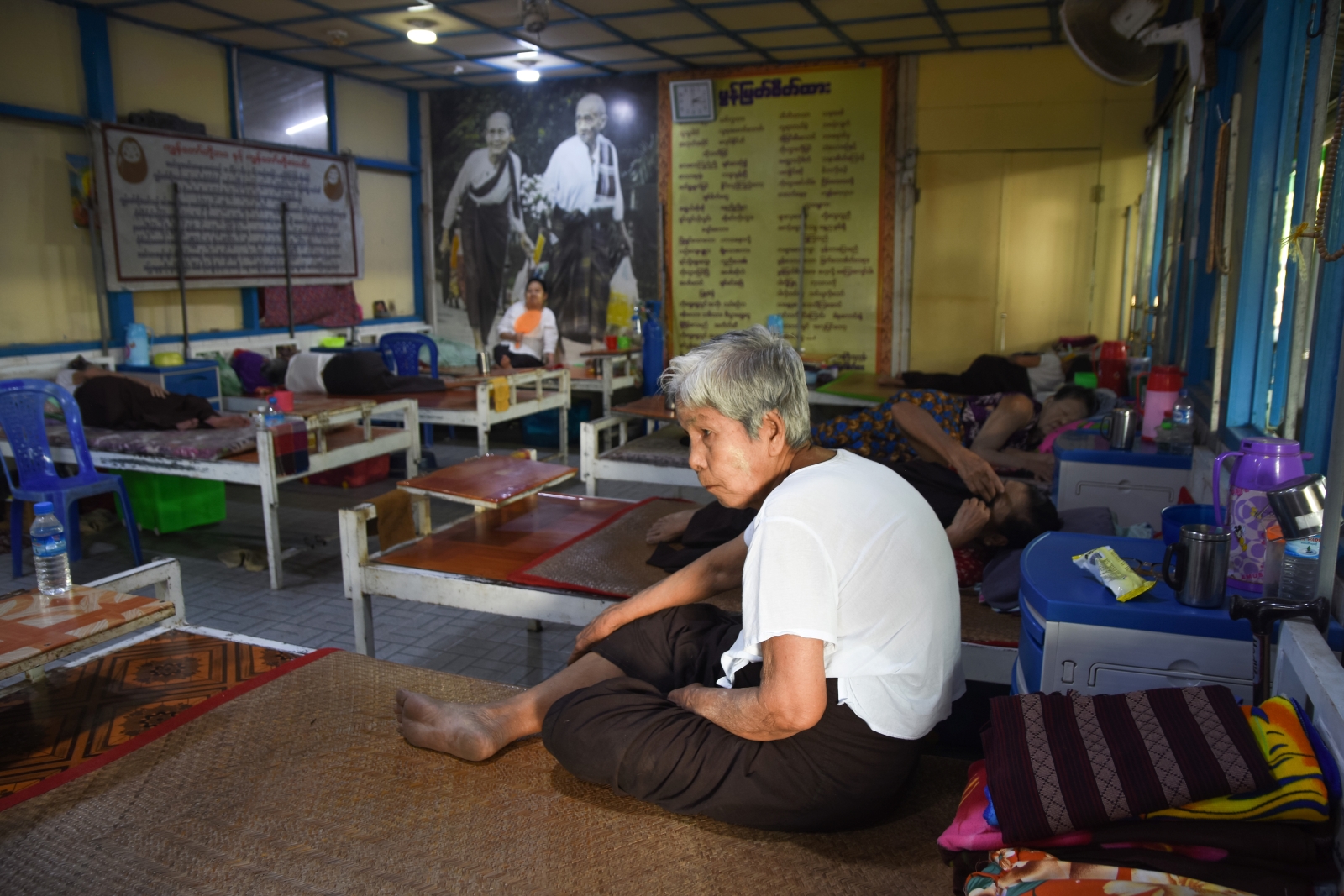The junta’s unveiling of a new bank note has spooked already jittery markets, with real estate prices in particular jumping to record highs in Mandalay and Nay Pyi Taw.
By FRONTIER
Real estate agents and property owners said prices in Mandalay and Nay Pyi Taw have soared by as much as 50 percent as investors fear a new wave of inflation, although recent economic instability may be caused mostly by market distrust.
Property has long been seen as a safe haven in times of hyperinflation and political instability, and the current crisis sparked by the February 2021 military coup is no exception.
“The market is on the rise but it’s business as usual. Most buyers are not concerned if they make a profit or not – they just don’t want to keep kyat in their hands,” said Ko Saw Si Thann, a real estate agent in Nay Pyi Taw, who added many of the buyers are “high-ranking” regime officials.
The military overthrew the elected National League for Democracy in February 2021, sparking a political crisis and mass street protests. Violent crackdowns on peaceful demonstrators then fuelled an armed uprising led by newly formed People’s Defence Forces in alliance with more established ethnic armed groups.
As the country slips into chaos, Myanmar’s wealthy have sought offload the unstable kyat for more reliable assets like real estate, US dollars, gold or cars. Before the coup, the kyat was valued at around K1,300 to the dollar, but now has plummeted to about K3,400 per dollar at the market rate.
In June, the United States sanctioned the Myanma Foreign Trade Bank and Myanma Investment and Commercial Bank, saying regime uses them to access foreign currency to buy weapons and jet fuel. The move rattled the market, with some observers saying the sanctions are the first to broadly impact Myanmar’s economy, rather than being narrowly targeted at the junta and its cronies.
But property brokers said the regime-controlled Central Bank’s announcement on July 23 that it would begin circulating a new K20,000 bank note had even more of an impact on the real estate markets in Mandalay, Myanmar’s second biggest city, and Nay Pyi Taw, the capital. Agents said prices soared in both cities, before stabilising at higher levels.
“I bought a 40 x 60 foot plot [12 x 18 metres] of land with a house in Thabyegon quarter in Zabuthiri Township for K80 million last year. Now a potential buyer would pay nearly K200 million for it. If the location was better, the price would be even higher,” one Nay Pyi Taw property owner said.
Properties valued at K80 million and K100 million before the announcement have roughly doubled in price, while higher-end properties – previously around the K500 million mark – have risen by about 20pc.
Inflation expectations
The new banknote features an image of Rattha Nandaka, a baby white elephant who has become a mascot for the State Administration Council – as the junta is formally known. White elephants are considered auspicious in Myanmar, traditionally believed to be the sign of a great king.
The K20,000 note was announced on the elephant’s first birthday and officially released on July 31, the day before junta leader Senior General Min Aung Hlaing unveiled the giant Maravijaya Buddha statue in Nay Pyi Taw.
The junta tried to pre-empt any fears that the note would cause inflation. SAC spokesperson Major General Zaw Min Tun said it would not be issued in large numbers and would only be used to replace worn-out banknotes taken out of circulation.
But few trust the military regime, and in a hyperpolarised political environment, the note has become another lightning rod for the opposition.
The resistance hit back, adding more instability to the equation. On July 27, the parallel National Unity Government, appointed by elected lawmakers ousted in the coup, declared that the newly issued K20,000 bank notes were illegal.
In Sagaing Region’s Salingyi Township, activists burned the notes in protest and urged members of the public not to use them, according to Khit Thit Media. The Thayet Chaung PDF in Tanintharyi Region even threatened to take action against anybody using them, a move that was criticised by local activists for going too far.
Despite all this commotion, it remains unclear whether the note has actually caused inflation.
“If the new note is adding to the total supply of money, then it could contribute to inflation,” said Mr Jared Bissinger, an economist and consultant with experience working in Myanmar. “However, it’s not clear how many of the new 20,000 kyat notes are being printed, and whether other notes are being withdrawn as these new ones are being released. The SAC is not exactly transparent about this.”
Regardless, the issuing of the new note has certainly had tangible effects on an already-jittery market.
Bissinger explained this could be a result of “inflation expectations”.
“People make decisions based on what they think will happen in the future. If we think prices will go up, we will take steps to try to mitigate that, like negotiating for a higher salary,” he said. “If they think the military is going to mismanage the economy (which a lot of people think) then they will act accordingly. They’ll move money away from kyat and into property, gold and foreign currency.”
Real estate agents in Mandalay and Nay Pyi Taw said some sellers had immediately pulled their properties from the market or were asking “impossible” prices following the announcement by the Central Bank.
The reveal also seemingly triggered further falls in the value of the kyat, which was trading at around K3,000 to the US dollar on the black market before the announcement and currently stands at about K3,400. The official Central Bank rate remains pegged at K2,100, and the regime last week issued a fresh threat to revoke licences if importers and exporters don’t use this rate for online transactions.

The concerns from the market and the general public are understandable, given the military’s history of sudden demonetisations. In 1985 military dictator General Ne Win abruptly demonetised the K100, K50 and K20 notes and introduced K25, K35 and K75 notes. Those new notes were themselves abolished two years later, and replaced in turn by K45 notes and K90 notes.
These erratic decisions wiped out the life savings of many ordinary citizens and contributed to the mass protests of 1988.
“Generally, the history of military governments releasing new banknotes in Myanmar is bad – remember some of the demonetisations were accompanied by the release of new bank notes. And their track record with inflation is similarly poor,” said Bissinger.
Against this backdrop, many are sceptical of the SAC’s assertions that the K20,000 note would be a “limited” and “commemorative” issue that would not contribute to inflation.
“So those fears are rooted in historical experience, and aren’t irrational at all,” Bissinger said, adding Myanmar society doesn’t trust the military regime “in any area, including in economic management”.
A buying frenzy
Whether inflation has been directly provoked by the introduction of the K20,000 note or by market distrust, the new denomination has had a clear impact on property prices.
Agents say sales in Nay Pyi Taw and Mandalay are currently brisker than in the commercial capital Yangon because bigger plots of land are more readily available.
Apartments built in the Thukha Tawun Housing development in Zabuthiri, which went on sale last year, have reached record prices.
“When the Thuka Tawun apartments were first sold in February 2022, I bought an apartment on the top floor for K19 million. Now it’s valued at between K40 and K50 million. A ground floor flat costs nearly K80 million. I knew prices might rise, but not by this much,” said one woman in Nay Pyi Taw.
But while she could fetch a handsome profit at this point, she’s not even considering selling due to the continued instability of the kyat.
In addition, infrastructure and communications have improved in Nay Pyi Taw, which was specially built as Myanmar’s new capital and declared open in 2006. Despite growing rapidly, the city of vast and often empty boulevards has a population of just 722,000, according to United Nations estimates.
“Compared to Yangon, Nay Pyi Taw is a little cheaper and business is about 10pc more active,” said U Kyaw Swa Myint, chair of the Myanmar Real Estate Agency Association’s Nay Pyi Taw chapter.
“Nay Pyi Taw has convenient communications, more living space and a regular supply of electricity. More and more people have moved here,” the association’s central chair U Aung Tun told the media in February.
Agents said the market is particularly busy in the three townships of Zabuthiri, Ottarathiri and Pobbathiri, with properties valued around K150 million selling the most.
Business is quieter in central Mandalay, but homes valued around K500 million in new developments in Chan Mya Tharzi and Pyigyitagon townships are proving popular, according to real estate agents in the city.
One agent, Ma May Lwin, said prices “skyrocketed” after the introduction of the K20,000 note.
“Some people bought property because they saw the price was rising. Some who were preparing to sell raised their prices again,” she said. “It makes our work difficult. Because there are more buyers, if we ask the price, the sellers raise it again.”
While many are speculators buying properties as investments, others are purchasing homes to live in out of necessity.
“Since the political situation began to get worse, people in conflict areas have moved into the city. They buy a house or an apartment if they can afford it,” she explained.
Real estate agents said prices show no signs of falling, something that sets the property market apart from other valuable assets. Saw Si Thann said the K20,000 note also pushed up the price of gold and vehicles, but this is more likely a temporary surge.
“Then those who bought [these assets] at high prices after the introduction of the K20,000 bank notes could lose out,” he said. “But once the real estate market rises, it usually doesn’t fall.”
Another agent in Yangon agreed.
“Real estate prices are high and show no signs of falling. Businesspeople will continue to invest in real estate because they have no other lines to pursue now,” said U Htay Myint, chair of Myanmar Real Estate Services Association for Yangon.
Bissinger said while not impossible, it’s “very rare” for property prices to decline in Myanmar.
“The biggest thing going on here is that prices are denominated in kyat, and as inflation has eroded the purchasing power of the kyat, the nominal value of property has continued to increase,” he said. “Property is generally a good hedge against inflation, and given that Myanmar has had many periods of significant inflation in recent decades, property has risen alongside that.”







